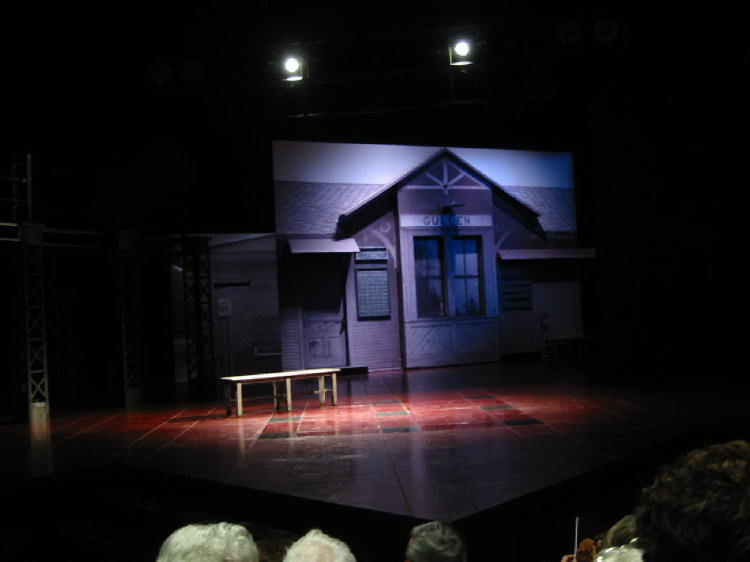Wednesday - The Visit
 The Visit, by the Swiss Friedrich Durrenmatt, is reminiscent of a Twilight Zone episode, or of Shirley Jackson’s The Lottery. A formerly prosperous town, Gullen, has fallen on hard times as commerce has dried up and trains have ceased making scheduled stops.
The Visit, by the Swiss Friedrich Durrenmatt, is reminiscent of a Twilight Zone episode, or of Shirley Jackson’s The Lottery. A formerly prosperous town, Gullen, has fallen on hard times as commerce has dried up and trains have ceased making scheduled stops.
Enter Claire Zachanassian, a former resident who dallied as a girl with a boy, Josef, became pregnant, and left town in disgrace and desperation when Josef got two others to testify at his paternity trial that they’d slept with her as well. She became a prostitute, was rescued from her brothel by a rich man who became enamored of her, and now returns to town as a multi-billionaire. It is a major event in town when her train actually stops. The town prepares a grovelling welcome for her, hoping that she will invest heavily there and salvage their economy.
Josef has become a shopkeeper in the town, is married with two kids and is being touted as its next mayor. Claire’s arrival doesn’t have much effect on him at first, though several men have encouraged him to warm up to her a little.
After some foreplay, however, Claire informs the town that she has no interest in investments, is still aggrieved at her treatment at the hands of its justice system, but has an offer: $1 billion for the town ($500 million for civic infrastructure such as schools, libraries and $500 million to be divided evenly among all its citizens) provided Josef is killed.
The citizens of course reject the offer out of hand. Claire takes up lodging and says, “I’ll wait!”
People go about their business as before, such as it is, and accommodate Claire’s entourage as entertainment. But the corrosive effect of Claire’s offer evinces itself in an interesting phenomenon: Josef notices that, little by little, people are starting to sport spiffy new items: shoes, tools, etc, and are buying more expensive things at his shop than they were wont. All on credit. (The stage production emphasizes this by using the color yellow - each new thing that someone acquires is bright yellow.) Even his family joins the conspicuous consumption bender.
It soon becomes obvious that the only way this level of borrowing can be sustained is if Josef is killed. At first, everyone seems to hope for a happy accident of some kind. However, a movement slowly develops to revisit the “justice” that was served upon Claire. Claire, for her part, makes no attempt to win hearts and minds - she is betting that new justice can be bought, that what we have come to regard as immutable social values springing from our rectitude as a species are really just a serendipitous and fleeting affectation that ebb and flow according to our economic well-being.
Turns out she’s right. As the last bastion of ethics, the schoolteacher, caves in and buys a fifth of Irish whiskey on credit from Josef, a trial is held, he is condemned, the mayor proclaims simultaneously that justice has prevailed at last and that the Claire Zachanassian Foundation has been established.
Like The Lottery, this is a little over-the-top as a metaphor for the fragility of our civil structure. However, it makes one think about how each of us, with our individual weakness, imperfect education and upbringing, has to make ethical decisions each day. In one sense, the locus of these individual behaviors determines how well we conduct ourselves as a larger society. In another, we implicitly rely on the state and its constitutional framework to nullify any negative outcomes from temporary individual weaknesses by striking down bad lawmaking and bad acting. We sneer when we see a small company town commit outrageous legal contortions in order to mollify its only employer - think mining and lumber towns and spotted owls nailed to telephone poles - smug in our assumption that overarching societal values will assert themselves to achieve a noble outcome.
But then, we see a whole state (Washington, for instance) chronically underfund education but set aside a popular vote to the contrary and help fund a billion dollars worth of stadium construction under the threat of the franchises to move to more generous climes. And we see a whole state (Washington, for instance) give away billions in tax forgiveness to retain a few shards of Boeing’s manufacturing operations, to a franchise that has already left town (moved corporate headquarters to Chicago). And we see a whole country that has made the SUV its primary mode of transportation, borrowing against the future of the environment and the lives of those who will have to go to war for oil.
Yeah, I think Claire’s still in town. I hear she’s single again. Wonder if she’s in a “marryin’” frame of mind?
